Middlesex University LAW 3103: Earl of Oxford Case - Coke's Defense
VerifiedAdded on 2023/06/17
|6
|1566
|317
Essay
AI Summary
This essay defends Sir Edward Coke's position in the Earl of Oxford's Case of 1615, a pivotal case highlighting the conflict between common law and equity. The essay provides an overview of the case, details Edward Coke's background as a barrister, judge, and politician, and elucidates his staunch defense of the supremacy of common law. Coke's arguments are presented within the context of the legal and political landscape of the time, emphasizing his commitment to upholding the rights of the people and the importance of established legal principles. The essay concludes that common law is crucial for just decision-making and national development. Desklib provides numerous resources for students, including solved assignments and past papers.
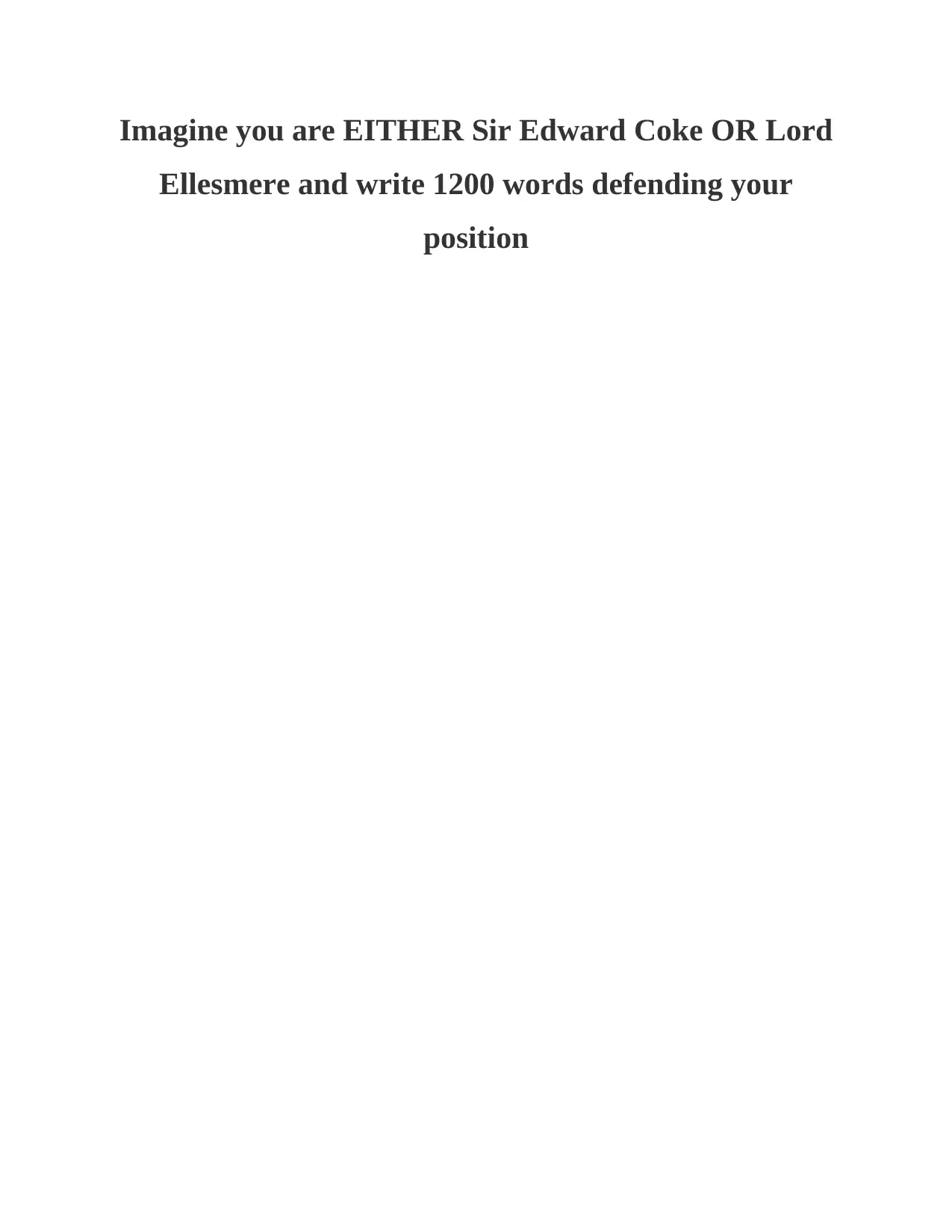
Imagine you are EITHER Sir Edward Coke OR Lord
Ellesmere and write 1200 words defending your
position
Ellesmere and write 1200 words defending your
position
Paraphrase This Document
Need a fresh take? Get an instant paraphrase of this document with our AI Paraphraser
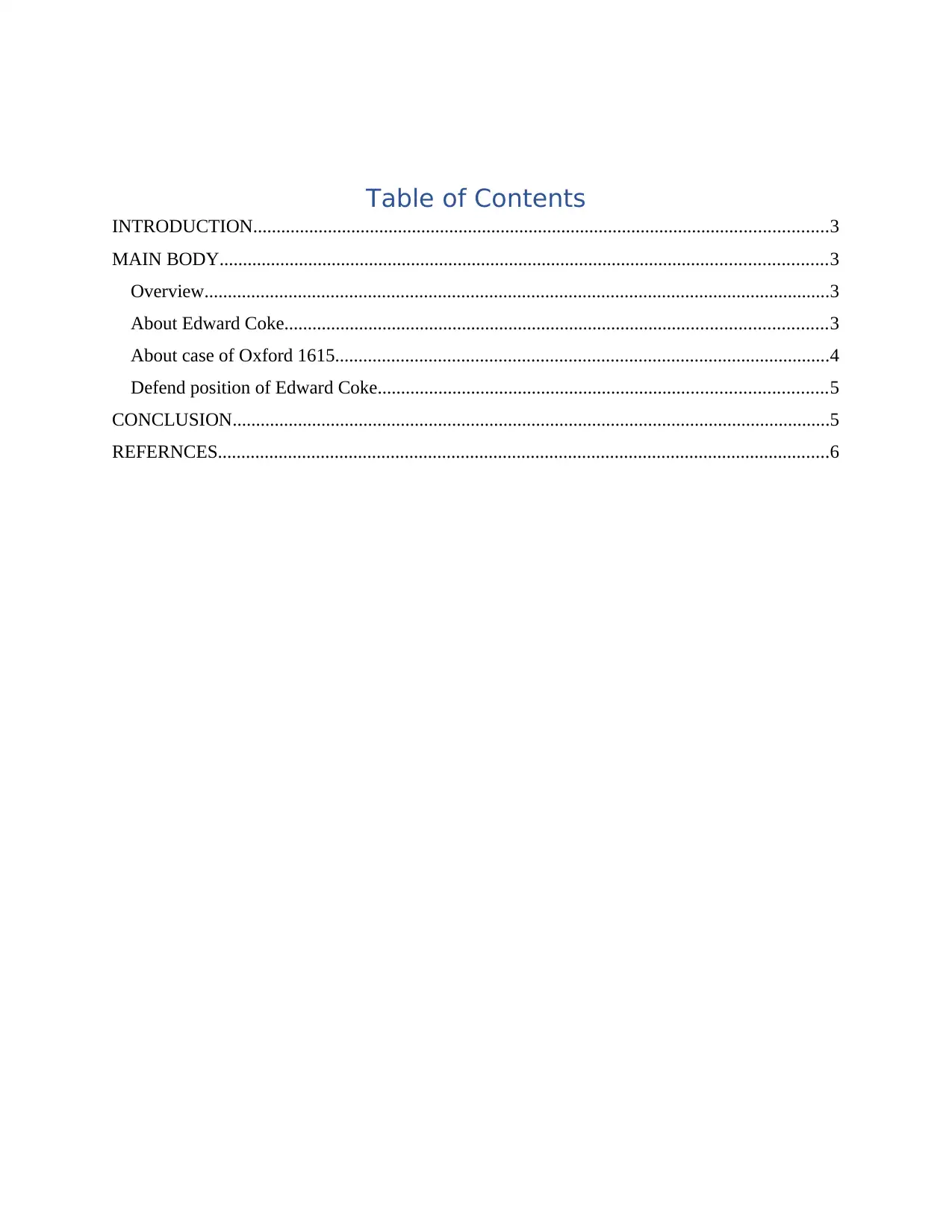
Table of Contents
INTRODUCTION...........................................................................................................................3
MAIN BODY..................................................................................................................................3
Overview......................................................................................................................................3
About Edward Coke....................................................................................................................3
About case of Oxford 1615..........................................................................................................4
Defend position of Edward Coke................................................................................................5
CONCLUSION................................................................................................................................5
REFERNCES...................................................................................................................................6
INTRODUCTION...........................................................................................................................3
MAIN BODY..................................................................................................................................3
Overview......................................................................................................................................3
About Edward Coke....................................................................................................................3
About case of Oxford 1615..........................................................................................................4
Defend position of Edward Coke................................................................................................5
CONCLUSION................................................................................................................................5
REFERNCES...................................................................................................................................6
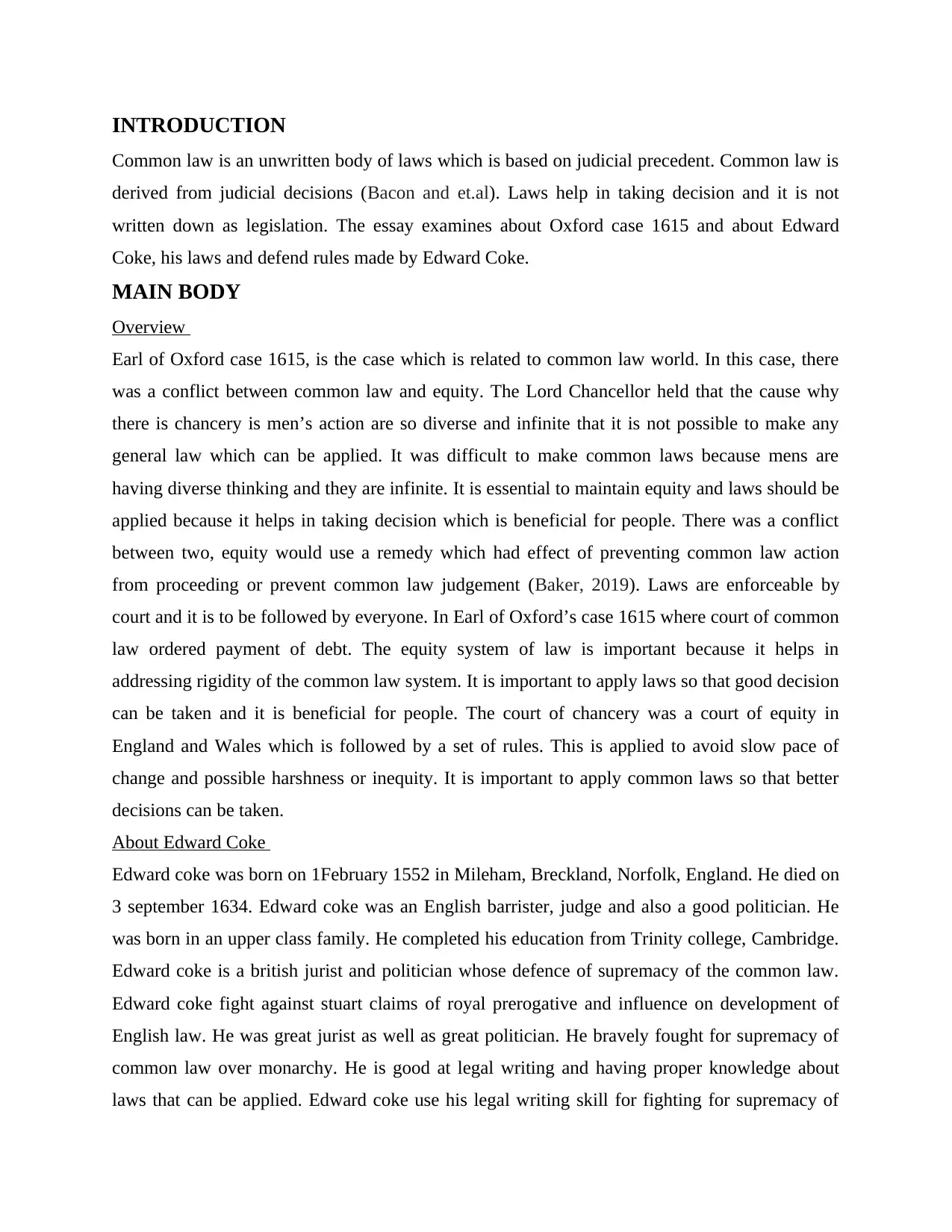
INTRODUCTION
Common law is an unwritten body of laws which is based on judicial precedent. Common law is
derived from judicial decisions (Bacon and et.al). Laws help in taking decision and it is not
written down as legislation. The essay examines about Oxford case 1615 and about Edward
Coke, his laws and defend rules made by Edward Coke.
MAIN BODY
Overview
Earl of Oxford case 1615, is the case which is related to common law world. In this case, there
was a conflict between common law and equity. The Lord Chancellor held that the cause why
there is chancery is men’s action are so diverse and infinite that it is not possible to make any
general law which can be applied. It was difficult to make common laws because mens are
having diverse thinking and they are infinite. It is essential to maintain equity and laws should be
applied because it helps in taking decision which is beneficial for people. There was a conflict
between two, equity would use a remedy which had effect of preventing common law action
from proceeding or prevent common law judgement (Baker, 2019). Laws are enforceable by
court and it is to be followed by everyone. In Earl of Oxford’s case 1615 where court of common
law ordered payment of debt. The equity system of law is important because it helps in
addressing rigidity of the common law system. It is important to apply laws so that good decision
can be taken and it is beneficial for people. The court of chancery was a court of equity in
England and Wales which is followed by a set of rules. This is applied to avoid slow pace of
change and possible harshness or inequity. It is important to apply common laws so that better
decisions can be taken.
About Edward Coke
Edward coke was born on 1February 1552 in Mileham, Breckland, Norfolk, England. He died on
3 september 1634. Edward coke was an English barrister, judge and also a good politician. He
was born in an upper class family. He completed his education from Trinity college, Cambridge.
Edward coke is a british jurist and politician whose defence of supremacy of the common law.
Edward coke fight against stuart claims of royal prerogative and influence on development of
English law. He was great jurist as well as great politician. He bravely fought for supremacy of
common law over monarchy. He is good at legal writing and having proper knowledge about
laws that can be applied. Edward coke use his legal writing skill for fighting for supremacy of
Common law is an unwritten body of laws which is based on judicial precedent. Common law is
derived from judicial decisions (Bacon and et.al). Laws help in taking decision and it is not
written down as legislation. The essay examines about Oxford case 1615 and about Edward
Coke, his laws and defend rules made by Edward Coke.
MAIN BODY
Overview
Earl of Oxford case 1615, is the case which is related to common law world. In this case, there
was a conflict between common law and equity. The Lord Chancellor held that the cause why
there is chancery is men’s action are so diverse and infinite that it is not possible to make any
general law which can be applied. It was difficult to make common laws because mens are
having diverse thinking and they are infinite. It is essential to maintain equity and laws should be
applied because it helps in taking decision which is beneficial for people. There was a conflict
between two, equity would use a remedy which had effect of preventing common law action
from proceeding or prevent common law judgement (Baker, 2019). Laws are enforceable by
court and it is to be followed by everyone. In Earl of Oxford’s case 1615 where court of common
law ordered payment of debt. The equity system of law is important because it helps in
addressing rigidity of the common law system. It is important to apply laws so that good decision
can be taken and it is beneficial for people. The court of chancery was a court of equity in
England and Wales which is followed by a set of rules. This is applied to avoid slow pace of
change and possible harshness or inequity. It is important to apply common laws so that better
decisions can be taken.
About Edward Coke
Edward coke was born on 1February 1552 in Mileham, Breckland, Norfolk, England. He died on
3 september 1634. Edward coke was an English barrister, judge and also a good politician. He
was born in an upper class family. He completed his education from Trinity college, Cambridge.
Edward coke is a british jurist and politician whose defence of supremacy of the common law.
Edward coke fight against stuart claims of royal prerogative and influence on development of
English law. He was great jurist as well as great politician. He bravely fought for supremacy of
common law over monarchy. He is good at legal writing and having proper knowledge about
laws that can be applied. Edward coke use his legal writing skill for fighting for supremacy of
⊘ This is a preview!⊘
Do you want full access?
Subscribe today to unlock all pages.

Trusted by 1+ million students worldwide
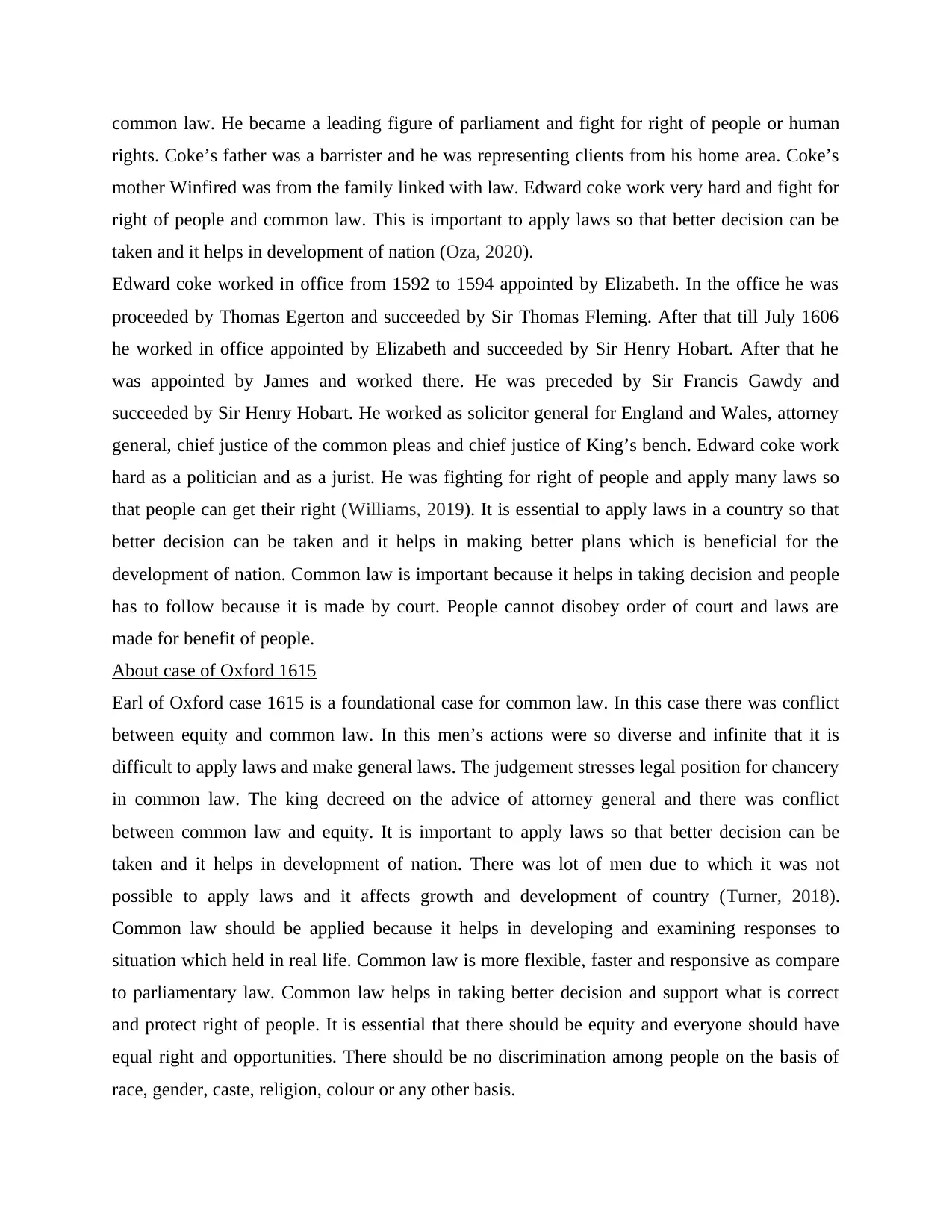
common law. He became a leading figure of parliament and fight for right of people or human
rights. Coke’s father was a barrister and he was representing clients from his home area. Coke’s
mother Winfired was from the family linked with law. Edward coke work very hard and fight for
right of people and common law. This is important to apply laws so that better decision can be
taken and it helps in development of nation (Oza, 2020).
Edward coke worked in office from 1592 to 1594 appointed by Elizabeth. In the office he was
proceeded by Thomas Egerton and succeeded by Sir Thomas Fleming. After that till July 1606
he worked in office appointed by Elizabeth and succeeded by Sir Henry Hobart. After that he
was appointed by James and worked there. He was preceded by Sir Francis Gawdy and
succeeded by Sir Henry Hobart. He worked as solicitor general for England and Wales, attorney
general, chief justice of the common pleas and chief justice of King’s bench. Edward coke work
hard as a politician and as a jurist. He was fighting for right of people and apply many laws so
that people can get their right (Williams, 2019). It is essential to apply laws in a country so that
better decision can be taken and it helps in making better plans which is beneficial for the
development of nation. Common law is important because it helps in taking decision and people
has to follow because it is made by court. People cannot disobey order of court and laws are
made for benefit of people.
About case of Oxford 1615
Earl of Oxford case 1615 is a foundational case for common law. In this case there was conflict
between equity and common law. In this men’s actions were so diverse and infinite that it is
difficult to apply laws and make general laws. The judgement stresses legal position for chancery
in common law. The king decreed on the advice of attorney general and there was conflict
between common law and equity. It is important to apply laws so that better decision can be
taken and it helps in development of nation. There was lot of men due to which it was not
possible to apply laws and it affects growth and development of country (Turner, 2018).
Common law should be applied because it helps in developing and examining responses to
situation which held in real life. Common law is more flexible, faster and responsive as compare
to parliamentary law. Common law helps in taking better decision and support what is correct
and protect right of people. It is essential that there should be equity and everyone should have
equal right and opportunities. There should be no discrimination among people on the basis of
race, gender, caste, religion, colour or any other basis.
rights. Coke’s father was a barrister and he was representing clients from his home area. Coke’s
mother Winfired was from the family linked with law. Edward coke work very hard and fight for
right of people and common law. This is important to apply laws so that better decision can be
taken and it helps in development of nation (Oza, 2020).
Edward coke worked in office from 1592 to 1594 appointed by Elizabeth. In the office he was
proceeded by Thomas Egerton and succeeded by Sir Thomas Fleming. After that till July 1606
he worked in office appointed by Elizabeth and succeeded by Sir Henry Hobart. After that he
was appointed by James and worked there. He was preceded by Sir Francis Gawdy and
succeeded by Sir Henry Hobart. He worked as solicitor general for England and Wales, attorney
general, chief justice of the common pleas and chief justice of King’s bench. Edward coke work
hard as a politician and as a jurist. He was fighting for right of people and apply many laws so
that people can get their right (Williams, 2019). It is essential to apply laws in a country so that
better decision can be taken and it helps in making better plans which is beneficial for the
development of nation. Common law is important because it helps in taking decision and people
has to follow because it is made by court. People cannot disobey order of court and laws are
made for benefit of people.
About case of Oxford 1615
Earl of Oxford case 1615 is a foundational case for common law. In this case there was conflict
between equity and common law. In this men’s actions were so diverse and infinite that it is
difficult to apply laws and make general laws. The judgement stresses legal position for chancery
in common law. The king decreed on the advice of attorney general and there was conflict
between common law and equity. It is important to apply laws so that better decision can be
taken and it helps in development of nation. There was lot of men due to which it was not
possible to apply laws and it affects growth and development of country (Turner, 2018).
Common law should be applied because it helps in developing and examining responses to
situation which held in real life. Common law is more flexible, faster and responsive as compare
to parliamentary law. Common law helps in taking better decision and support what is correct
and protect right of people. It is essential that there should be equity and everyone should have
equal right and opportunities. There should be no discrimination among people on the basis of
race, gender, caste, religion, colour or any other basis.
Paraphrase This Document
Need a fresh take? Get an instant paraphrase of this document with our AI Paraphraser
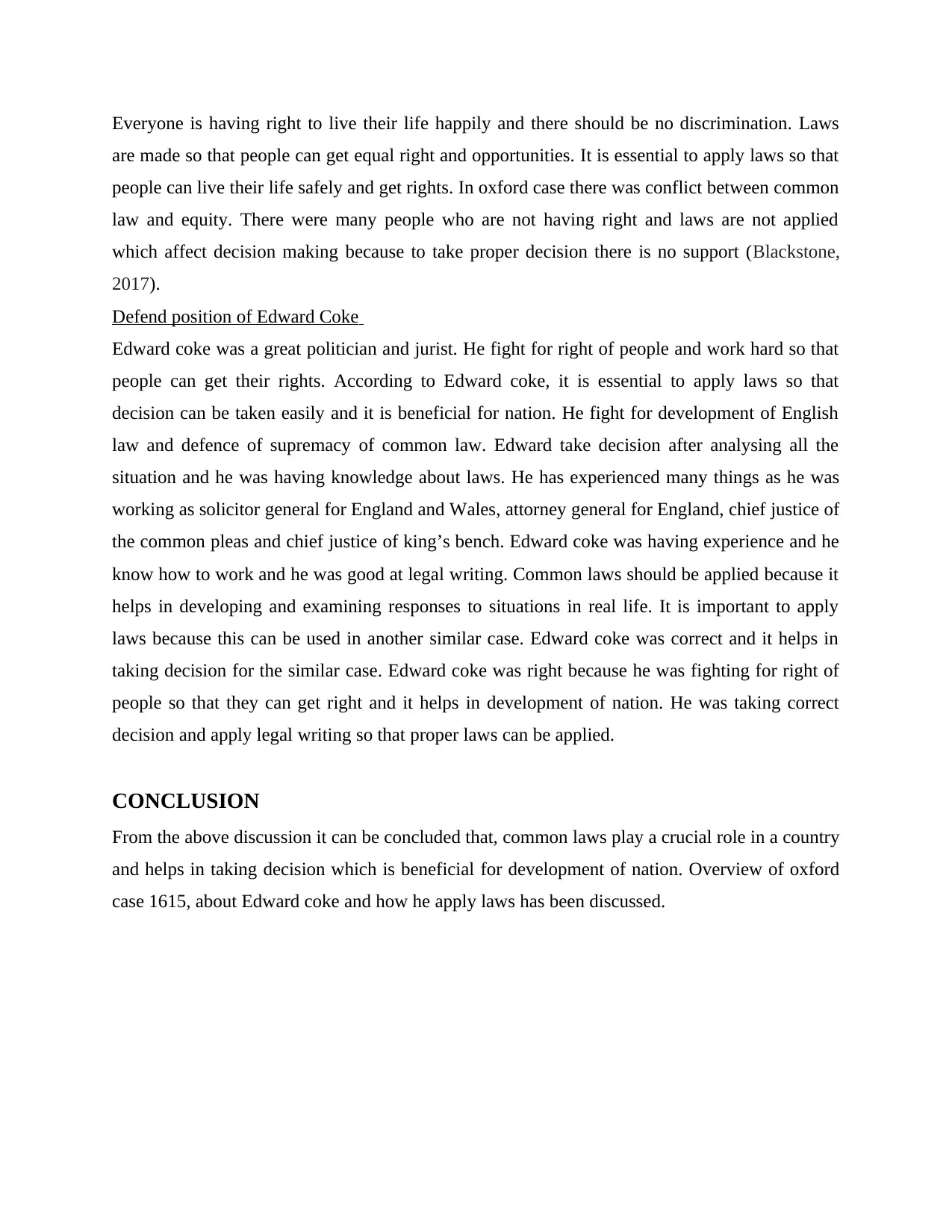
Everyone is having right to live their life happily and there should be no discrimination. Laws
are made so that people can get equal right and opportunities. It is essential to apply laws so that
people can live their life safely and get rights. In oxford case there was conflict between common
law and equity. There were many people who are not having right and laws are not applied
which affect decision making because to take proper decision there is no support (Blackstone,
2017).
Defend position of Edward Coke
Edward coke was a great politician and jurist. He fight for right of people and work hard so that
people can get their rights. According to Edward coke, it is essential to apply laws so that
decision can be taken easily and it is beneficial for nation. He fight for development of English
law and defence of supremacy of common law. Edward take decision after analysing all the
situation and he was having knowledge about laws. He has experienced many things as he was
working as solicitor general for England and Wales, attorney general for England, chief justice of
the common pleas and chief justice of king’s bench. Edward coke was having experience and he
know how to work and he was good at legal writing. Common laws should be applied because it
helps in developing and examining responses to situations in real life. It is important to apply
laws because this can be used in another similar case. Edward coke was correct and it helps in
taking decision for the similar case. Edward coke was right because he was fighting for right of
people so that they can get right and it helps in development of nation. He was taking correct
decision and apply legal writing so that proper laws can be applied.
CONCLUSION
From the above discussion it can be concluded that, common laws play a crucial role in a country
and helps in taking decision which is beneficial for development of nation. Overview of oxford
case 1615, about Edward coke and how he apply laws has been discussed.
are made so that people can get equal right and opportunities. It is essential to apply laws so that
people can live their life safely and get rights. In oxford case there was conflict between common
law and equity. There were many people who are not having right and laws are not applied
which affect decision making because to take proper decision there is no support (Blackstone,
2017).
Defend position of Edward Coke
Edward coke was a great politician and jurist. He fight for right of people and work hard so that
people can get their rights. According to Edward coke, it is essential to apply laws so that
decision can be taken easily and it is beneficial for nation. He fight for development of English
law and defence of supremacy of common law. Edward take decision after analysing all the
situation and he was having knowledge about laws. He has experienced many things as he was
working as solicitor general for England and Wales, attorney general for England, chief justice of
the common pleas and chief justice of king’s bench. Edward coke was having experience and he
know how to work and he was good at legal writing. Common laws should be applied because it
helps in developing and examining responses to situations in real life. It is important to apply
laws because this can be used in another similar case. Edward coke was correct and it helps in
taking decision for the similar case. Edward coke was right because he was fighting for right of
people so that they can get right and it helps in development of nation. He was taking correct
decision and apply legal writing so that proper laws can be applied.
CONCLUSION
From the above discussion it can be concluded that, common laws play a crucial role in a country
and helps in taking decision which is beneficial for development of nation. Overview of oxford
case 1615, about Edward coke and how he apply laws has been discussed.
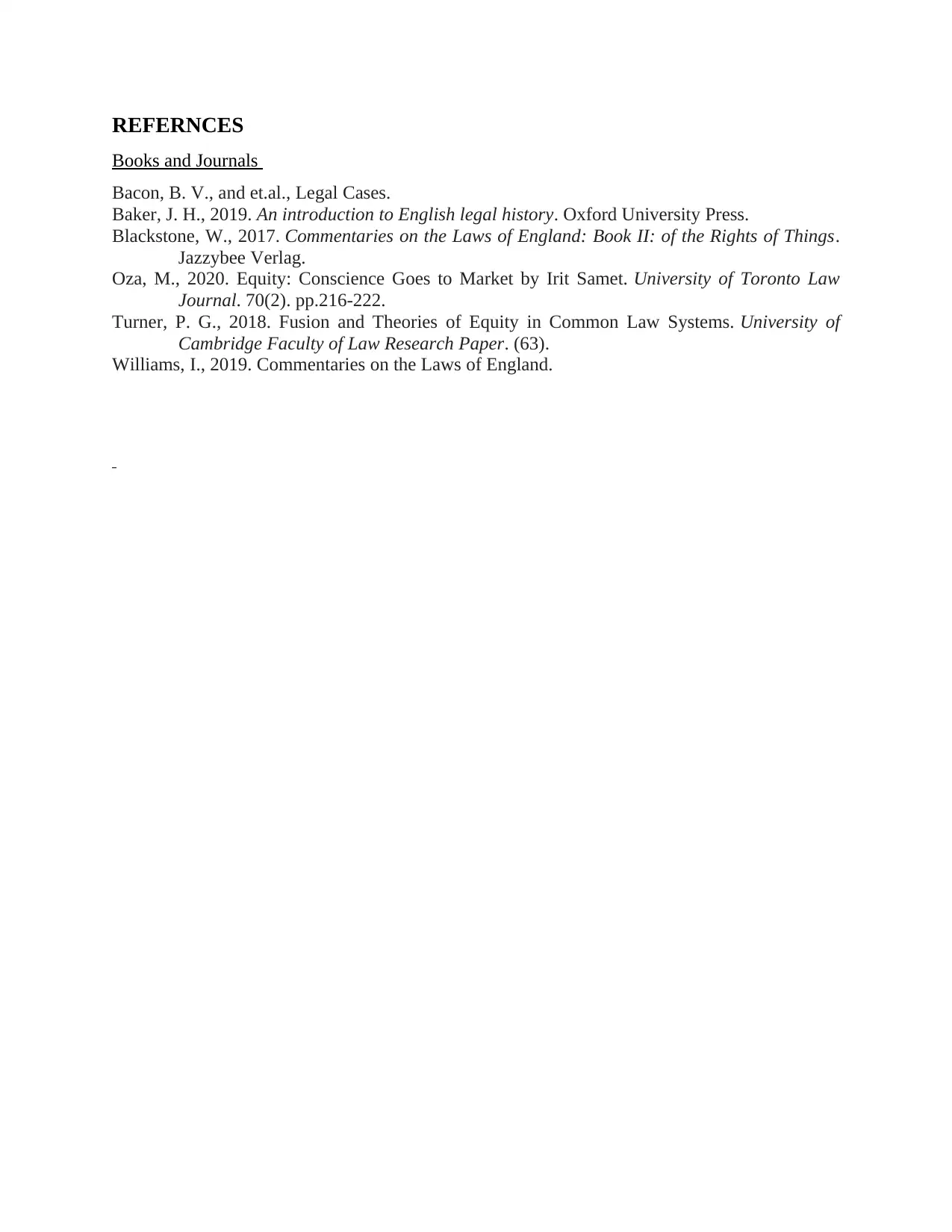
REFERNCES
Books and Journals
Bacon, B. V., and et.al., Legal Cases.
Baker, J. H., 2019. An introduction to English legal history. Oxford University Press.
Blackstone, W., 2017. Commentaries on the Laws of England: Book II: of the Rights of Things.
Jazzybee Verlag.
Oza, M., 2020. Equity: Conscience Goes to Market by Irit Samet. University of Toronto Law
Journal. 70(2). pp.216-222.
Turner, P. G., 2018. Fusion and Theories of Equity in Common Law Systems. University of
Cambridge Faculty of Law Research Paper. (63).
Williams, I., 2019. Commentaries on the Laws of England.
Books and Journals
Bacon, B. V., and et.al., Legal Cases.
Baker, J. H., 2019. An introduction to English legal history. Oxford University Press.
Blackstone, W., 2017. Commentaries on the Laws of England: Book II: of the Rights of Things.
Jazzybee Verlag.
Oza, M., 2020. Equity: Conscience Goes to Market by Irit Samet. University of Toronto Law
Journal. 70(2). pp.216-222.
Turner, P. G., 2018. Fusion and Theories of Equity in Common Law Systems. University of
Cambridge Faculty of Law Research Paper. (63).
Williams, I., 2019. Commentaries on the Laws of England.
⊘ This is a preview!⊘
Do you want full access?
Subscribe today to unlock all pages.

Trusted by 1+ million students worldwide
1 out of 6
Your All-in-One AI-Powered Toolkit for Academic Success.
+13062052269
info@desklib.com
Available 24*7 on WhatsApp / Email
![[object Object]](/_next/static/media/star-bottom.7253800d.svg)
Unlock your academic potential
Copyright © 2020–2026 A2Z Services. All Rights Reserved. Developed and managed by ZUCOL.